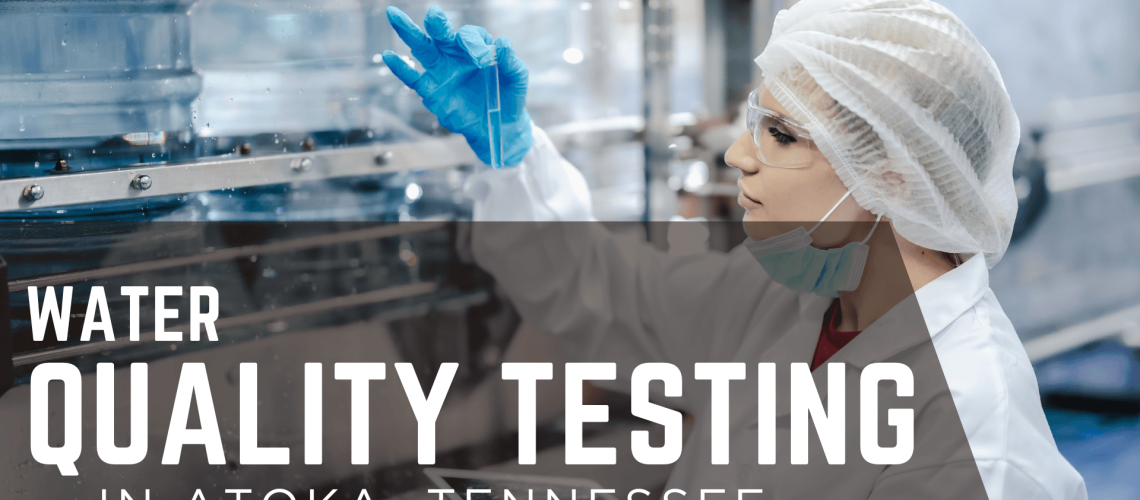When most homebuyers think about inspections, they picture checking outlets, roofs, or foundations — not faucets. But the water flowing through your pipes is every bit as important to your family’s health and comfort as any other part of the home.
In Atoka, Tennessee, and the surrounding Tipton County area, both municipal and private water systems serve local homes. And while most water in West Tennessee is naturally clean, contamination can occur anywhere between the source and your tap. That’s why professional water quality testing is one of the most valuable — and affordable — services a homeowner can schedule.
Why Water Quality Matters
We drink it, cook with it, bathe in it, and wash our clothes in it. Water is part of nearly everything we do at home. Yet most people never think to test it unless there’s an obvious odor, taste, or discoloration.
The truth is that even clear, odor-free water can contain unseen contaminants — from naturally occurring minerals like iron and manganese to health-related risks such as bacteria, nitrates, or lead.
While Atoka’s municipal water generally meets state and federal standards, older homes with outdated plumbing, private wells, or cross-connections can introduce issues downstream. Testing helps ensure your water is safe for your family and identifies any filtration or maintenance steps that may be needed.
Common Contaminants Found in West Tennessee
During my inspections across Tipton County, I’ve seen water test results vary widely between homes only a few streets apart. That’s because factors like plumbing materials, water source, and soil conditions all play a role.
Some of the most common findings include:
- Bacteria (Coliform & E. coli): Indicates possible contamination from groundwater or septic systems.
- Lead: Often leaches from older solder joints or galvanized pipes, especially in homes built before 1988.
- Nitrates & Nitrites: Can enter well water from fertilizers or septic seepage — a serious concern for infants and expectant mothers.
- Iron & Manganese: Not dangerous, but can stain fixtures, laundry, and leave metallic tastes.
- Hardness (Calcium & Magnesium): Leads to scale buildup in pipes and appliances, reducing efficiency.
Each of these issues requires a different type of solution — which is why accurate testing is essential before choosing a filter or treatment system.
Municipal vs. Well Water in Atoka
Most homes in Atoka are connected to the municipal water system, but rural properties and older developments may still rely on private wells.
Municipal water is treated and monitored, but homeowners are still responsible for what happens inside the plumbing system. For example, older copper or galvanized lines can still introduce contaminants, even if city water meets standards at the meter.
Well water, on the other hand, is completely unregulated — meaning testing is the homeowner’s responsibility. The Tennessee Department of Environment and Conservation recommends testing private wells at least once a year for bacteria and every few years for full panels of contaminants.
When to Test Your Home’s Water
You should consider professional water testing if:
- You’re purchasing a home with a private well or older plumbing.
- You’ve noticed changes in taste, odor, or color.
- There has been recent flooding or construction nearby.
- You’re installing a new water filtration or softener system.
- You simply want reassurance about what’s in your water.
Testing during a home inspection is especially valuable, as it provides a baseline report for the property. Buyers can use this to negotiate repairs or upgrades, and sellers can demonstrate confidence in their home’s safety.
How Professional Testing Works
At Upchurch Inspection, I collect samples directly from your tap or well source using certified lab containers and handling protocols. Samples are then analyzed by a state-certified laboratory for:
- Bacteria and microbiological contamination
- Metals and minerals
- Nitrates and nitrites
- Lead, copper, and hardness levels
The results typically return within a few days, providing a clear, easy-to-read report that identifies whether contaminants are within safe limits.
For homes with specific concerns — such as sulfur odor, discoloration, or visible sediment — I can customize the test panel to include those additional parameters.
Improving Water Quality
If your test results show issues, don’t panic — most problems can be corrected with straightforward solutions:
- Activated carbon filters for chlorine, taste, and odor.
- Reverse osmosis systems for lead, nitrates, and dissolved solids.
- Water softeners for hardness.
- UV disinfection for bacteria in well water.
Addressing water quality isn’t just about health; it also protects plumbing systems, extends appliance life, and prevents staining or corrosion throughout the home.
The Bottom Line
Clean water isn’t something to assume — it’s something to verify. Whether you’re buying a new home in Atoka, living on well water in rural Tipton County, or simply curious about what’s in your tap, water testing offers peace of mind and practical solutions.
At Upchurch Inspection, I perform professional water testing alongside full home inspections or as a standalone service. You’ll receive accurate lab results, expert interpretation, and straightforward recommendations to keep your water — and your home — safe.
📞 Schedule Your Atoka Water Test or Home Inspection Today
Serving Atoka, Munford, Brighton, and communities across West Tennessee, Upchurch Inspection offers certified home inspections, water testing, mold testing, radon testing, and sewer scope inspections.
📞 Call (901) 350-8885 or visit UpchurchInspection.com to schedule your inspection today.


